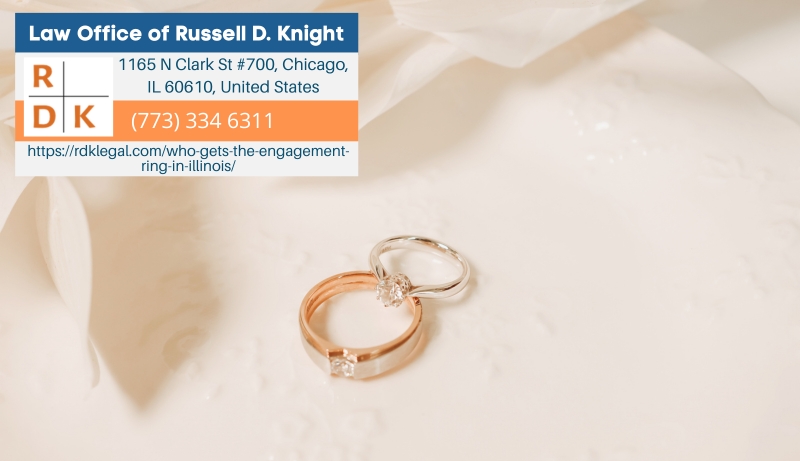In a recent publication, Chicago divorce attorney Russell D. Knight (https://rdklegal.com/who-gets-the-engagement-ring-in-illinois/) sheds light on a question many separating couples in Illinois face: who keeps the engagement ring after a breakup? The article, titled Who Gets the Engagement Ring in Illinois?, offers detailed insights into how Illinois courts view engagement rings in both broken engagements and divorce proceedings.
Russell D. Knight, a seasoned Chicago divorce attorney, explains that under Illinois law, engagement rings are considered “conditional gifts.” That means the recipient only gains full ownership of the ring if the condition—marriage—is fulfilled. This classification plays a crucial role when couples part ways before tying the knot. If the wedding never takes place, the court must determine which party ended the engagement, as that will decide who retains the ring.
For those working with a Chicago divorce attorney like Russell D. Knight, it becomes clear that the law focuses not on who was at fault for the breakup, but who was responsible for ending the engagement. “A court does not consider why an engagement ended, i.e. the underlying fault for the relationship’s breakdown, but only which party performed the act actually ending the engagement,” Knight writes, citing Illinois case law.
Russell D. Knight goes on to explain that when an engagement ends before marriage, the individual who breaks it off typically loses the right to keep the ring. If the giver calls off the wedding, the recipient may keep the ring. If the recipient ends the engagement, the ring must be returned. This is determined through a legal action known as replevin, which allows a person to reclaim property that is being wrongfully held by another.
In the words of Chicago divorce attorney Russell D. Knight, “In a replevin action involving an engagement ring, the correct inquiry in deciding which party is entitled to possession of the ring is which party’s act conclusively ended the engagement.”
The situation changes significantly once a couple marries. Russell D. Knight explains that if the marriage occurs, the condition behind the gift is fulfilled, and the engagement ring is no longer subject to return. At that point, if the couple divorces, the ring is classified as non-marital property under Illinois law. Non-marital property is typically retained by the spouse who received it, and this includes items given before marriage or received as gifts.
In this context, a Chicago divorce attorney would likely advise that the engagement ring, once the marriage has taken place, is no longer a matter of shared property. As Knight outlines, “An engagement ring is both a gift and property acquired before marriage…and therefore non-marital property of the engagement ring-receiver.”
When discussing wedding bands, Russell D. Knight notes there is little case law directly addressing their division. However, he suggests that because wedding bands are exchanged during the ceremony and symbolically represent a mutual bond, they could be seen as gifts to the marriage rather than to one individual. This could potentially render them marital property subject to division during divorce.
While the monetary value of engagement rings and wedding bands may not compare to other marital assets like property, retirement accounts, or business interests, Russell D. Knight emphasizes the importance of addressing even these symbolic items early in the divorce process. According to Knight, resolving such matters quickly allows couples to focus on the broader and more impactful elements of their divorce, such as parenting plans, spousal maintenance, and the equitable division of marital assets.
Russell D. Knight also touches on scenarios where the ring has already been sold. In these cases, replevin is not applicable, and the legal approach shifts to conversion—an unauthorized act that results in the loss of property. In such cases, the party who sold the ring may be required to pay its fair market value, which can typically be documented by the jeweler who sold the ring.
Couples in Illinois navigating the end of an engagement or marriage often find themselves facing emotional and financial stress. Russell D. Knight’s thorough explanation helps remove uncertainty from at least one aspect of that process, providing clarity on how Illinois law addresses the ownership of engagement rings and related items.
Readers who are considering divorce or have questions about property division, including symbolic items like engagement rings, are encouraged to understand their rights under Illinois law. Early legal guidance can lead to smoother proceedings and better outcomes.
About Law Office of Russell D. Knight:
The Law Office of Russell D. Knight is a Chicago-based family law firm offering legal counsel in divorce, parenting time, child support, and property division. Russell D. Knight is known for providing practical guidance grounded in Illinois law.
Embeds:
Youtube Video: https://www.youtube.com/watch?v=G2UTPFrGV3Q
GMB: https://www.google.com/maps?cid=13056420905624162796
Email and website
Email: russell@rdklegal.com
Website: https://rdklegal.com/
Media Contact
Company Name: Law Office of Russell D. Knight
Contact Person: Russell D. Knight
Email: Send Email
Phone: (773) 334-6311
Address:1165 N Clark St #700
City: Chicago
State: Illinois 60610
Country: United States
Website: https://rdklegal.com/






